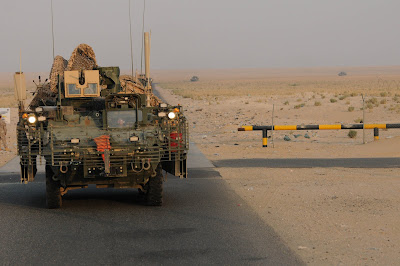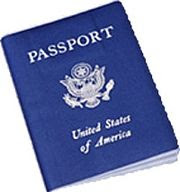____________________
 President Barack Obama delivered a nineteen minute address tonight declaring the end of American combat operations in Iraq. Over the last few weeks, the Administration has sought to take credit for the military success that led to this event - the surge of 2007 and 2008. Most of the rhetoric has emanated from Vice President Joe Biden, with some support from Secretary of State Hillary Clinton.
President Barack Obama delivered a nineteen minute address tonight declaring the end of American combat operations in Iraq. Over the last few weeks, the Administration has sought to take credit for the military success that led to this event - the surge of 2007 and 2008. Most of the rhetoric has emanated from Vice President Joe Biden, with some support from Secretary of State Hillary Clinton.
The President said that "we persevered." I wonder who "we" is, since all three - Obama, Biden and Clinton - opposed the surge that led to the ability of American forces to turn over the fight to the Iraqis. While in the Senate, this trio voted to not fund the surge and demanded the premature withdrawal of American forces. To me, that borders on hypocrisy.
The President doesn't get it.
Although the President rightly praised American troops for their "courage and resolve," he could not pass up the chance to belittle their sacrifice with the statement that success was due to "our troops and civilians." Mr. President, it was our men and women who wear the uniform, most of the time with body armor and weapons, that carried the day, not your beloved diplomats. If it was up to some of the diplomats over at State Department, we would have quit the fight years ago. See my earlier piece, What is the favorite wine over at State Department?
The statement that operations in Iraq will continue with "our dedicated civilians in the lead" is ludicrous. American policy in Iraq will be shaped by the 50,000 American troops still in the country. Make no mistake - there is considerable combat power still there. Several heavy brigade combat teams have been renamed as "advise and assist brigades." The units have the same TO&E (table of organization and equipment) and soldiers from these brigades have told me that they still conduct the same missions "outside the wire."
Mr. President, you can't declare victory and go home. Even worse, you can't continue your administration's dangerous practice of conducting military operations on a politically-driven timetable. Your comment that what we are witnessing is the execution of a promise made in February is telling. This is not a political campaign, this is American foreign policy.
It gets better - sorry, I mean it gets worse. President Obama, you reaffirmed yet again that all American troops will depart the country by the end of 2011. Haven't you learned yet that these artificial deadlines put our troops at risk? Even your own generals have said that these dates are "giving our enemy sustenance." See my earlier piece, Afghanistan and that pesky withdrawal date.
There are a host of problems in Iraq, not the least of which is the failure of the politicians to form a new government based on the elections seven months earlier this year. I am very disappointed that Iyad 'Alawi has been unable to form a coalition with himself as prime minister - he certainly is the best hope for a unified Iraq. What we do not need is continued American support for the current prime minister Nuri al-Maliki. Al-Maliki claimed that Iraq was now an independent nation following the rhetorical withdrawal of American combat forces. Al-Maliki is an ungrateful puppet of the Iranians. His nickname - Nuri al-Irani (Nuri the Iranian) says it all.
Of course, no President Obama address would be complete without a reference to Afghanistan and our mission to "disrupt, dismantle and defeat al-Qa'idah." He's getting better at understanding that al-Qa'idah is no longer a major presence in Afghanistan - he actually talked about the Taliban. Now he needs to work on why we need to defeat the Taliban, but that's a discussion for another time.
The most egregious statements about Afghanistan again concern his artificial deadlines. As with his statement on Iraq, he reaffirmed his commitment to a transition in Afghanistan on July 31, 2011. Transition is Obama/Biden-speak for withdrawal. As Biden recently said, "In July of 2011 you're going to see a whole lot of people moving out. Bet on it." That does not sound like conditions-based analysis of the situation, it sounds like a campaign promise.
I also found it interesting that the President opened his remarks with the domestic agenda - "we need to rebuild our nation at home." He also came back to that same theme later on with comments about the middle class and almost ventured into the "blame Bush" rhetoric that most Americans have tired of some time ago. I was pleasantly surprised with his analysis of what it will take to resolve our domestic challenges and thought that he almost sounded like a capitalist. Maybe there is hope for change after all.
As far as Iraq and Afghanistan though, he just doesn't get it.




 General James Conway, Commandant of the U.S. Marine Corps, said that a specific date gives "sustenance" to the Taliban. His words: “In some ways, we think right now it’s probably giving our enemy sustenance….In fact, we’ve intercepted communications that say, ‘Hey, you know, we only have to hold out for so long.’” He quickly sought to soften those remarks - after all, he is still a serving military officer and is expected to toe the Administration line whether he believes it or not. Obviously, he does not.
General James Conway, Commandant of the U.S. Marine Corps, said that a specific date gives "sustenance" to the Taliban. His words: “In some ways, we think right now it’s probably giving our enemy sustenance….In fact, we’ve intercepted communications that say, ‘Hey, you know, we only have to hold out for so long.’” He quickly sought to soften those remarks - after all, he is still a serving military officer and is expected to toe the Administration line whether he believes it or not. Obviously, he does not. General David Petraeus, commander of U.S. and NATO forces in Afghanistan, puts a different spin on the withdrawal date, and then goes a step further and advocates talking to the Taliban.
General David Petraeus, commander of U.S. and NATO forces in Afghanistan, puts a different spin on the withdrawal date, and then goes a step further and advocates talking to the Taliban.


 Less than a week after the border clash between soldiers of the Lebanese Army and Israel Defense Forces, at least two members of Congress have chosen to overreact. Two prominent Democrat Jewish members, Howard L. Berman (California), chairman of the House Foreign Affairs Committee, and Nita M. Lowey (New York), chairwoman of the Appropriations subcommittee on foreign operations, froze military aid to Lebanon because the money provided by the United States might be used to buy arms that could be turned against Israel. Berman said, "I cannot in good conscience allow the United States to continue sending weapons to Lebanon."
Less than a week after the border clash between soldiers of the Lebanese Army and Israel Defense Forces, at least two members of Congress have chosen to overreact. Two prominent Democrat Jewish members, Howard L. Berman (California), chairman of the House Foreign Affairs Committee, and Nita M. Lowey (New York), chairwoman of the Appropriations subcommittee on foreign operations, froze military aid to Lebanon because the money provided by the United States might be used to buy arms that could be turned against Israel. Berman said, "I cannot in good conscience allow the United States to continue sending weapons to Lebanon."









